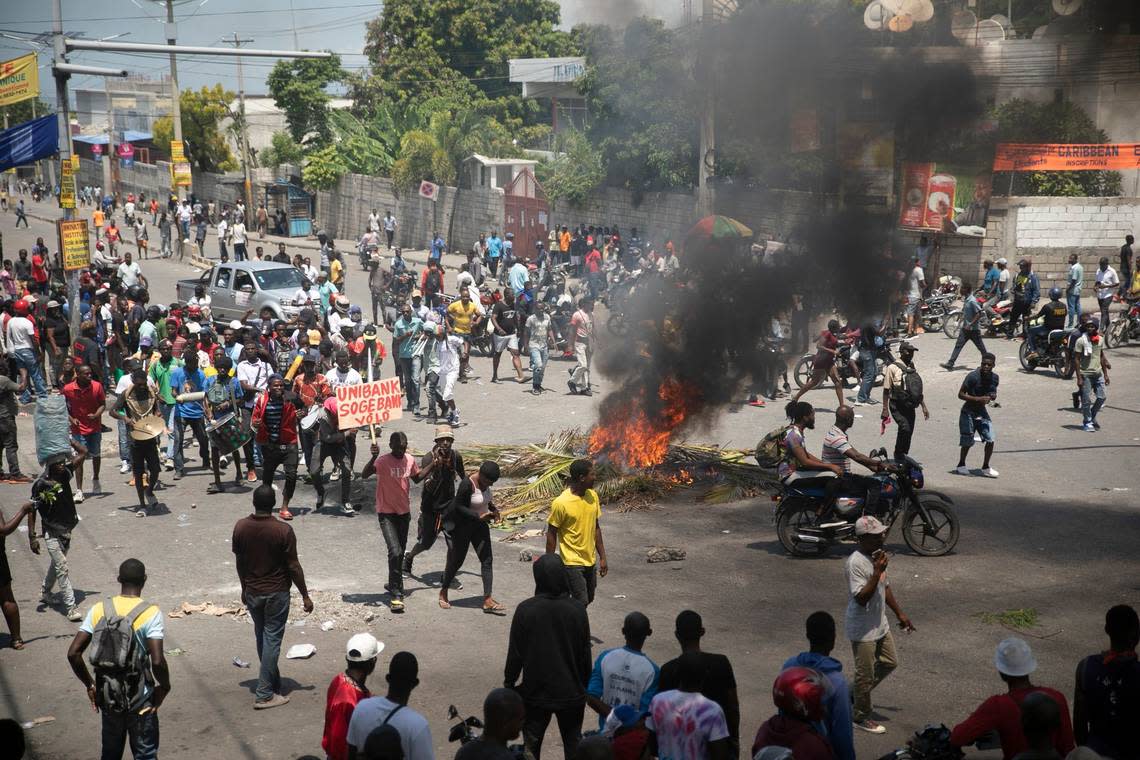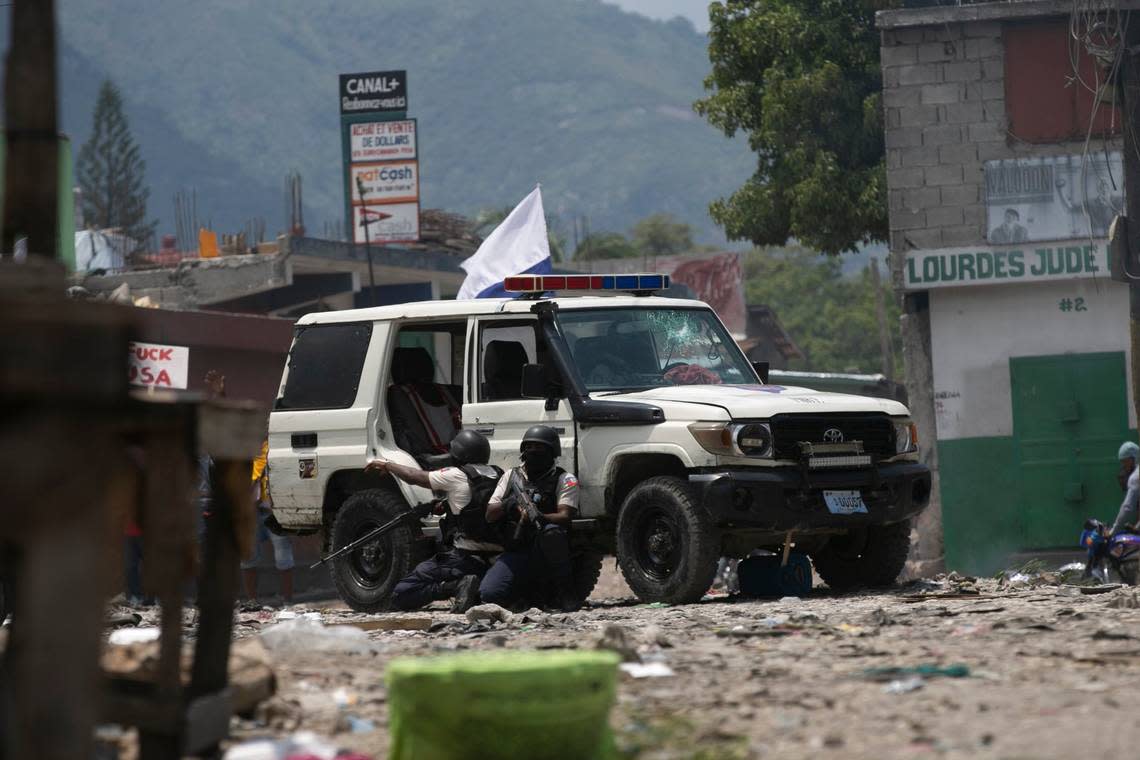Haiti’s decision to raise fuel prices met with fire, fury, paralysis
Haitians woke up Tuesday to fiery barricades, closed streets and a flight cancellation by a major U.S. carrier, the result of increased tensions stemming from an announced hike in fuel prices.
American Airlines, which had already reduced its service to Haiti to just one daily flight, confirmed to the Miami Herald that it had canceled its Tuesday morning flight because road closures in Port-au-Prince were making it difficult for travelers. France’s ambassador to Haiti, Fabrice Mauriès, concerned about the welfare of those needing to come to its embassy located along the Champ de Mars, not far from downtown, announced that he was closing the embassy’s doors until further notice.
“The embassy recommends: Limit your trips to what is strictly necessary; be very careful when traveling; provide a stock of basic necessities at home,” Mauriès tweeted.
Frustrations over gang violence and the rising cost of living have been stoking tensions for weeks in Haiti, where some have been financing violent anti-government protests in hopes of ousting interim Prime Minister Ariel Henry. The economic situation has been made worse by a scarcity of fuel and a thriving black market for diesel, gasoline and propane, a black market that flourishes despite a government crackdown.
Late Sunday, in an address to the nation, Henry announced a gradual increase in fuel prices. The government has said that the increase is needed to save over $400 million a year in fuel subsidies, money that could then be invested in badly needed social programs. But the failure to effectively articulate that message has led to foes politicizing the situation and fueling demands for Henry’s dismissal.
For most of the morning Tuesday, commercial activities in Port-au-Prince were tangled up after rogue attempts were made to lock down the capital by shutting streets, businesses and all economic activity. The effort began the night before with young men in trucks and on motorcycles dumping tires, pouring gas on them and setting them ablaze to create fiery barricades. Overnight, more barricades sprang up, blocking passage along major thoroughfares. Some individuals were attacked by rocks when they tried to cross the barricades and shootings were reported in some upscale neighborhoods of the capital.

While Haiti faces many challenges, including a more than 50% increase in food costs, the fuel issue may be the most volatile, manifested in long lines and rising tensions at the pumps amid a worsening unavailability.
Haitians currently pay $2.08 a gallon for gas, $2.93 a gallon for diesel and $2.92 a gallon for kerosene — lower than what American consumers pay — thanks to government subsidies. The subsidies, Henry said, are costing Haiti about 50 billion gourdes or over $415 million annually. That’s about 20% of the country’s $2 billion annual budget.
That, and the fact the government dictates their revenues at the pump, has made it difficult for petroleum companies to pay suppliers. Last month two companies that supplied 40% of the petroleum products on the Haitian market decided to stop ordering, exacerbating shortages. On the black market Tuesday, gas was selling for between $21 and $25 a gallon.
Haiti police are still struggling. But here’s how they recently made strides against gangs
The problem had worsened last Friday when gangs attacked a pilot boat and kidnapped two workers, including the captain. That led to a strike, further blocking distribution of over 188,000 barrels of fuel, though the pilots went back to work Tuesday.
The situation remains unstable 14 months after the assassination of Haitian President Jovenel Moïse. None of the suspects currently jailed has been formally charged in Haiti for his slaying, the process is on its fifth investigative judge and the ongoing political turmoil and gang violence continue to deepen. Though a recent crackdown on contraband and illegal arms at the country’s ports resulted in a decrease in kidnappings and gang activities, Henry increasingly finds himself the target of political foes.
Adding to tensions and concerns over deepening instability has been the lack of a broad political consensus between the interim government and other groups, including a civil society-led coalition known as the Montana Accord.
This is not the first time the Haitian government has sought to raise the price of fuel and it’s been met with protest. A decision by the Moïse government in July 2018 to increase the price of fuel was later suspended after it led to violent protests and a devastating months-long national economic lockdown known as Peyi lòk. On Tuesday, concerns about another lockdown emerged as Haiti was looking at just one week’s worth of fuel availability in its reserves.
In a reminder of Haiti’s gang violence, three people — 17-year-old Christelle Delva, and two journalists, Frantzsen Charles and Tayson Latigue — were shot to death Saturday in Cité Soleil. In a tweet, Henry condemned the slayings, declaring himself “deeply shocked by the news of the murder of two journalists...in the exercise of their profession.”

“We strongly condemn this barbaric act, while sending our heartfelt thoughts to the families of the victims and their colleagues,” he said.
On Tuesday, there was more devastating news. An account executive at Digicel, the country’s leading telecom provider, Marie Lydie Duvivier, was killed in her car in Torcel on the outskirts of the capital while on her way to the U.S. Embassy for a visa appointment.
She was ambushed and her vehicle fired upon after she turned back, a colleague said.
Also three Haiti National Police officers were killed, reportedly by members of the TiMakak gang in the hills above the capital in the Laboule area. The killings were filmed by the gang, which also took the officers’ bodies and several weapons. The Inspector General Office of the police has opened an investigation into the slayings.
In taking the decision to cancel its 10:15 AA 949 flight into Port-au-Prince Tuesday, American Airlines said it had done so because “road closures throughout Port-au-Prince are impacting the ability of customers and team members to arrive at the airport.”
“We’ve canceled today’s daily service between Miami International Airport [MIA] and Toussaint Louverture International Airport [PAP],” American Airlines spokeswoman Laura Masvidal said. “We are closely monitoring the situation and will make any additional adjustments to our operations as needed.”
JetBlue’s communications team said their flights out of Fort Lauderdale and New York were still operating.
